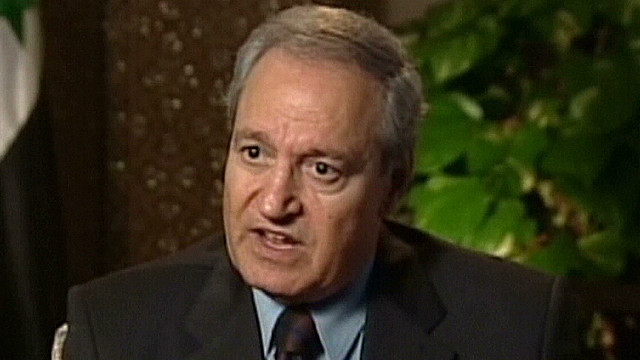
Mystery surrounds Syrian vice president
- NEW: At least 135 are killed across Syria on Sunday, an opposition group reports
- The U.N. will maintain a presence in Syria after the 300 military observers leave
- The vice president, whom rebels say defected, is absent from Eid prayers in Damascus
- Rebels have been trying to get the vice president into Jordan, a spokesman says
(CNN) -- The mandate of the U.N. observer mission in Syria ended Sunday, with the country no closer to a lasting peace than when monitors arrived four months ago.
Even after the 300 observers leave, the United Nations will maintain a presence in the war-torn country in the form of a new liaison office supporting "efforts for a political solution."
"We will continue the search to move from violence to dialogue," said the mission's leader, Lt. Gen. Babacar Gaye.
The U.N. monitoring mission itself clearly did not go as hoped. International observers first arrived in Syria in April, on the heels of a cease-fire ostensibly agreed upon by the government and rebels. But the cease-fire never took hold, and violence soon surged.
Over the past month, opposition activists have reported upwards of 150 deaths a day. That violence continued Sunday, when much of the country was celebrating Eid al-Fitr holiday marking the end of fasting during Ramadan, Islam's holiest month.
At least 135 people were killed Sunday throughout the nation, the opposition Local Coordination Committees reported.
This figure includes 47 deaths in and around Damascus, among them an undetermined number of people killed by "indiscriminate mortar shelling" in Theyabeih. As dusk settled in Sunday, residents of another Damascus suburb, Housh Arab, were in the dark due to similar shelling, the LCC reported.
The same group said that regime forces executed 14 people in Daraa province -- out of 40 killed in the province, overall -- hours after the individuals were detained.
Explosions and "intense gunfire from heavy machine guns" were also heard Sunday night in the west-central city of Hama, according to the LCC. And five people reportedly died when two residential buildings collapsed in the Aleppo neighborhood of Sakhour because of shelling.
Earlier in the day, clashes erupted between government and rebel fighters when regime forces tried to take over the Damascus suburb of al Qadm, the opposition Syrian Observatory for Human Rights said.
Meanwhile, state-run TV aired footage of Eid prayers in Damascus attended by Syrian leaders, including President Bashar al-Assad.
But Vice President Farouq al-Sharaa -- whom rebels say has defected from the regime -- was noticeably absent from the service.
Caught in middle, people of Aleppo frantic for peace
Louai Miqdad, a spokesman for the rebel Free Syrian Army, said Saturday that al-Sharaa has fled the regime. Opposition fighters were trying to get the vice president -- whom Miqdad said left Damascus a week ago, heading to his home province of Daraa -- across the border into Jordan, despite government attacks.
Syrian state-run TV did not explicitly say if al-Sharaa had defected, but said the vice president's office issued a statement saying al-Sharaa "has never at any moment thought of leaving the homeland to whatever direction."
As of Sunday al-Sharaa's location was not known.
If al-Sharaa did defect, it would mark the highest-level departure from al-Assad's regime yet.
Such a defection would follow a stream of resignations by Syrian officials in recent weeks, including Republican Guard Brig. Gen. Manaf Tlas and Prime Minister Riyad Hijab. Like al-Sharaa, the men are Sunni Muslims who held top posts in a government dominated by the country's Alawite minority.
Inside Syria: Nobody imagined it would turn into this
Observers view al-Sharaa's power and influence as more significant than that of the prime minister, who only served in his post for weeks.
Al-Sharaa has more clout as a prominent member of the regime's old guard who served as foreign minister under al-Assad and his late father, Hafez, for more than 20 years.
Andrew Tabler, a Syria expert at the Washington Institute for Near East Policy, said al-Sharaa may have defected "because the battle now has become so sectarian," with an opposition dominated by Sunnis fighting against pro-regime Alawites.
Rafif Jouejati, a spokeswoman for the LCC opposition network, said al-Sharaa's defection could suggest "the regime is collapsing very quickly."
"If confirmed, (this) represents yet another high-level official who sees that the al-Assad regime is a sinking ship," she said. "I expect to see additional defections in both the military and civilian sectors in the coming days."
Complete coverage of CNN Inside Syria
CNN's Joe Sterling, Holly Yan, Salma Abdelaziz and Nic Robertson contributed to this report.
riverside domestic violence attorney bibliotherapy course ma in counselling and psychotherapy
No comments:
Post a Comment